[ad_1]
Why are calories eaten in the morning less fattening than calories eaten in the evening?
One reason calories consumed in the morning are less fattening than those eaten in the evening is that more calories are burned off in the morning due to diet-induced thermogenesis. That’s the amount of energy the body takes to digest and process a meal, given off in part as waste heat. If people are given the same meal in the morning, afternoon, or night, their body uses up about 25 percent more calories to process it in the afternoon than at night and about 50 percent more calories to digest it in the morning, as you can see below and at 0:36 in my video Eat More Calories in the Morning Than the Evening. That leaves fewer net calories in the morning to be stored as fat.
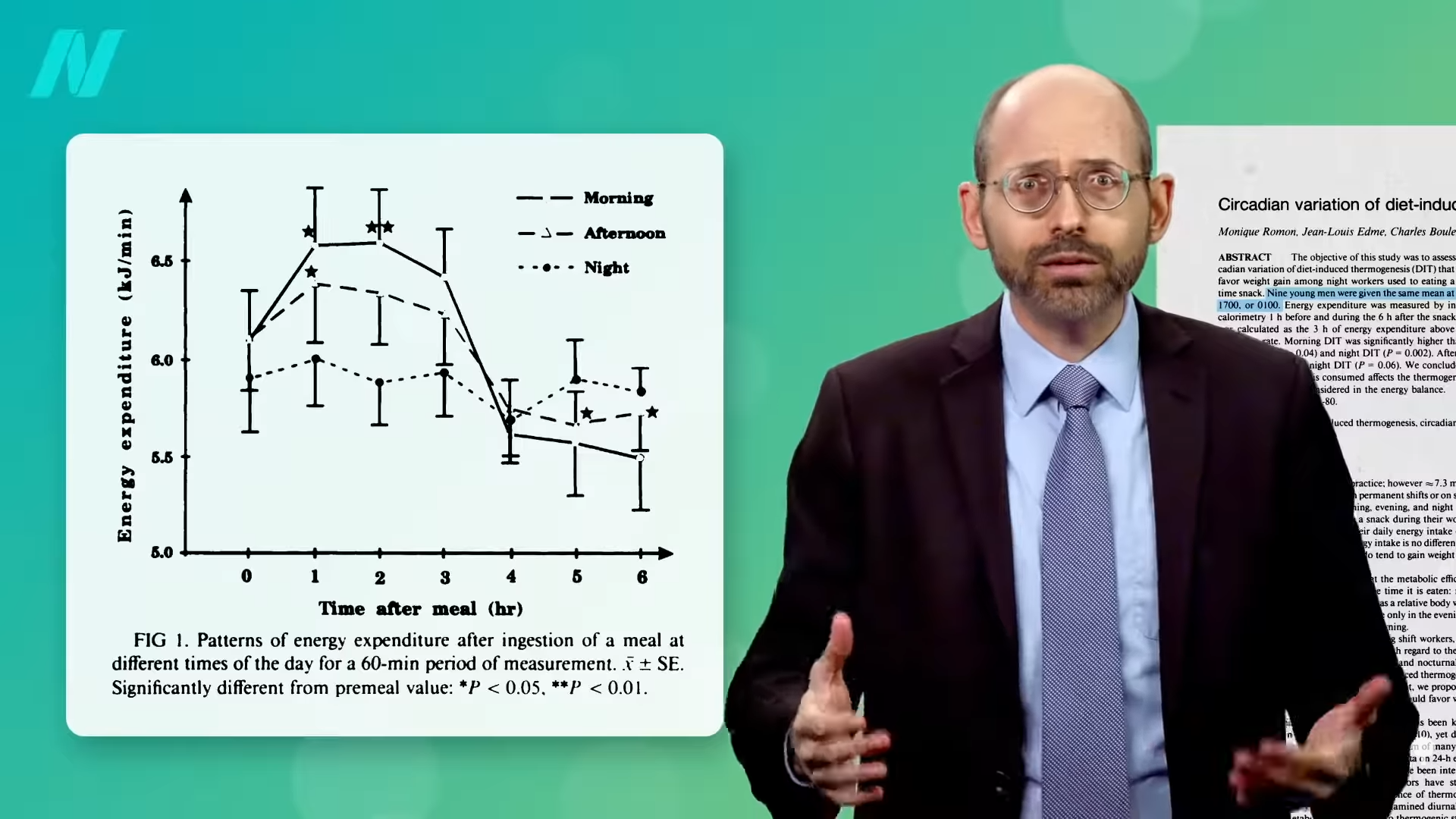
Let’s put some actual numbers to it. A group of Italian researchers randomized 20 people to eat the same standardized meal at either 8:00 am or 8:00 pm and had them return a week later to do the opposite. So, each person had a chance to eat the same meal for breakfast and dinner. After every meal, the study participants were placed in a “calorimeter” contraption to precisely measure how many calories they were burning over the next three hours. As you can see below and at 1:18 in my video, the researchers calculated that the meal given in the morning took about 300 calories to digest, whereas the same meal given at night only used up about 200 calories to process. The meal was about 1,200 calories, but, when eaten in the morning, it ended up only providing about 900 calories compared to more like 1,000 calories at night. Same meal, same food, same amount of food, but effectively 100 fewer calories when consumed in the morning rather than at night. So, a calorie is not just a calorie. It depends on when we eat it.

But why do we burn more calories when eating a morning meal? Is it behavioral or biological? If you started working the graveyard shift, sleeping during the day and working all night, which meal would net you fewer calories? Would it be the “breakfast” you had at night before you went to work or the “dinner” you had in the morning before you went to bed? In other words, is it something about eating before you go to sleep that causes your body to hold onto more calories, or is it built into our circadian rhythm, where we store more calories at night regardless of what we’re doing? You don’t know until you put it to the test.
Harvard researchers randomized people to identical meals at 8:00 am versus 8:00 pm while under simulated night shifts or day shifts. Regardless of activity level or sleeping cycle, the number of calories that were burned processing the morning meals was 50 percent higher than in the evening, as you can see in the graph below and at 2:45 in my video. So, the difference is explained by chronobiology: It’s just part of our circadian rhythm to burn more meal calories in the morning. But, why? What exactly is going on?
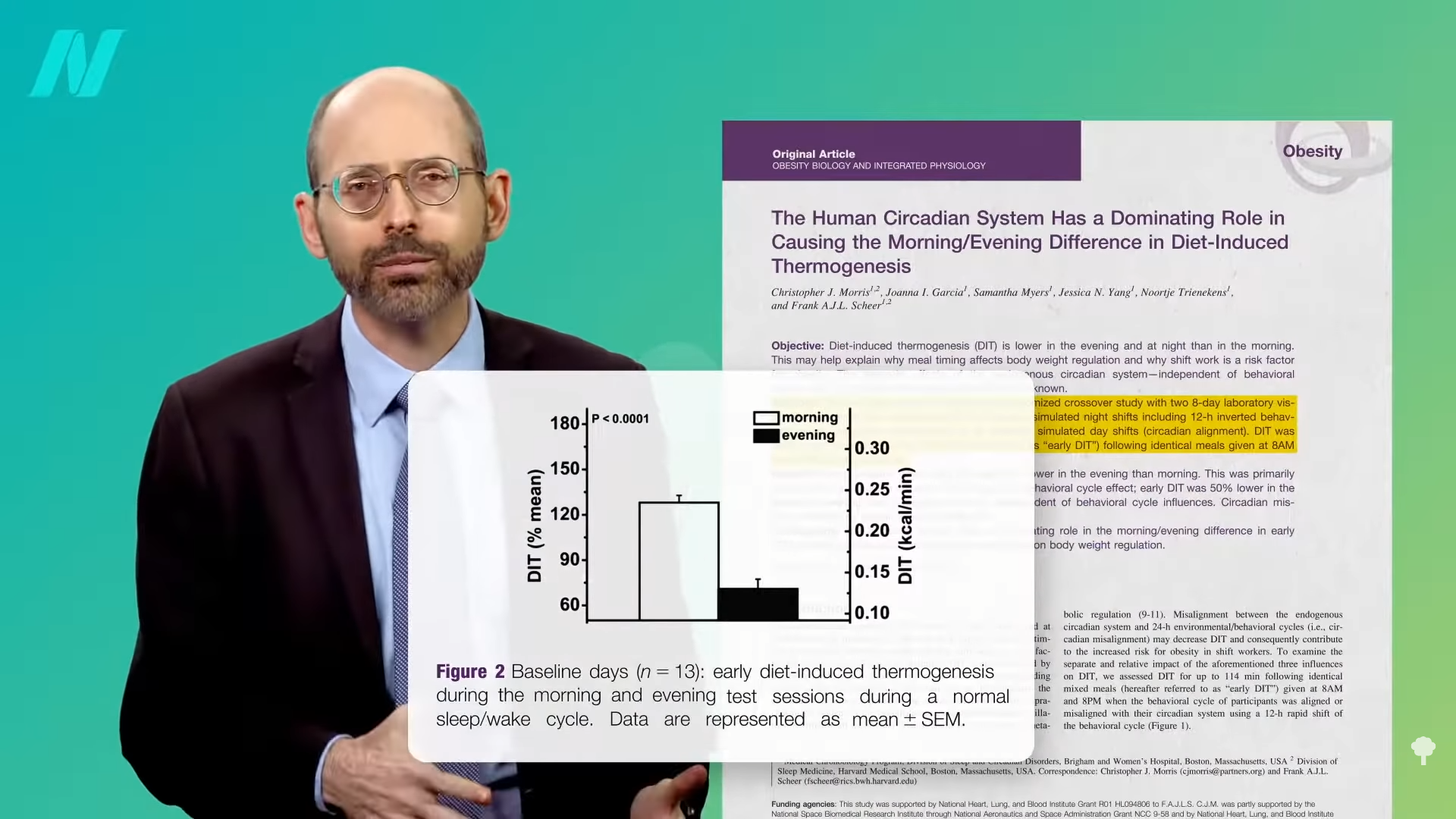
How does it make sense for our body to waste calories in the morning when we have the whole day ahead of us?
Our body isn’t so much wasting calories as investing them. When we eat in the morning, our body bulks up our muscles with glycogen, which is the primary energy reserve our body uses to fuel our muscles, but this takes energy. In the evening, our body expects to be sleeping for much of the next 12 hours, so rather than storing blood sugar as extra glycogen in our muscles, it preferentially uses it as an energy source, which may end up meaning we burn less of our backup fuel (body fat). In the morning, however, our body expects to be running around all day, so instead of just burning off breakfast, our body continues to dip into its fat stores while we use breakfast calories to stuff our muscles full of the energy reserves we need to move around over the day. That’s where the “inefficiency” may come from. The reason it costs more calories to process a morning meal is that, instead of just burning glucose (blood sugar) directly, our body uses up energy to string glucose molecules together into chains of glycogen in our muscles, which are then just going to be broken back down into glucose later in the day. That extra assembly/disassembly step takes energy—energy that our body takes out from the meal, leaving us with fewer calories.
So, in the morning, our muscles are especially sensitive to insulin, rapidly pulling blood sugar out of our bloodstream to build up glycogen reserves. At night, though, our muscles become relatively insulin-resistant and resist the signal to take in extra blood sugar. So, does that mean you get a higher blood sugar and insulin spike in the evening compared to eating the same meal in the morning? Yes. As you can see in the graph below and at 5:02 in my video, in that 100-calorie-difference study, for example, blood sugars rose twice as high after the 8:00 pm meal compared to the same meal eaten in the morning.
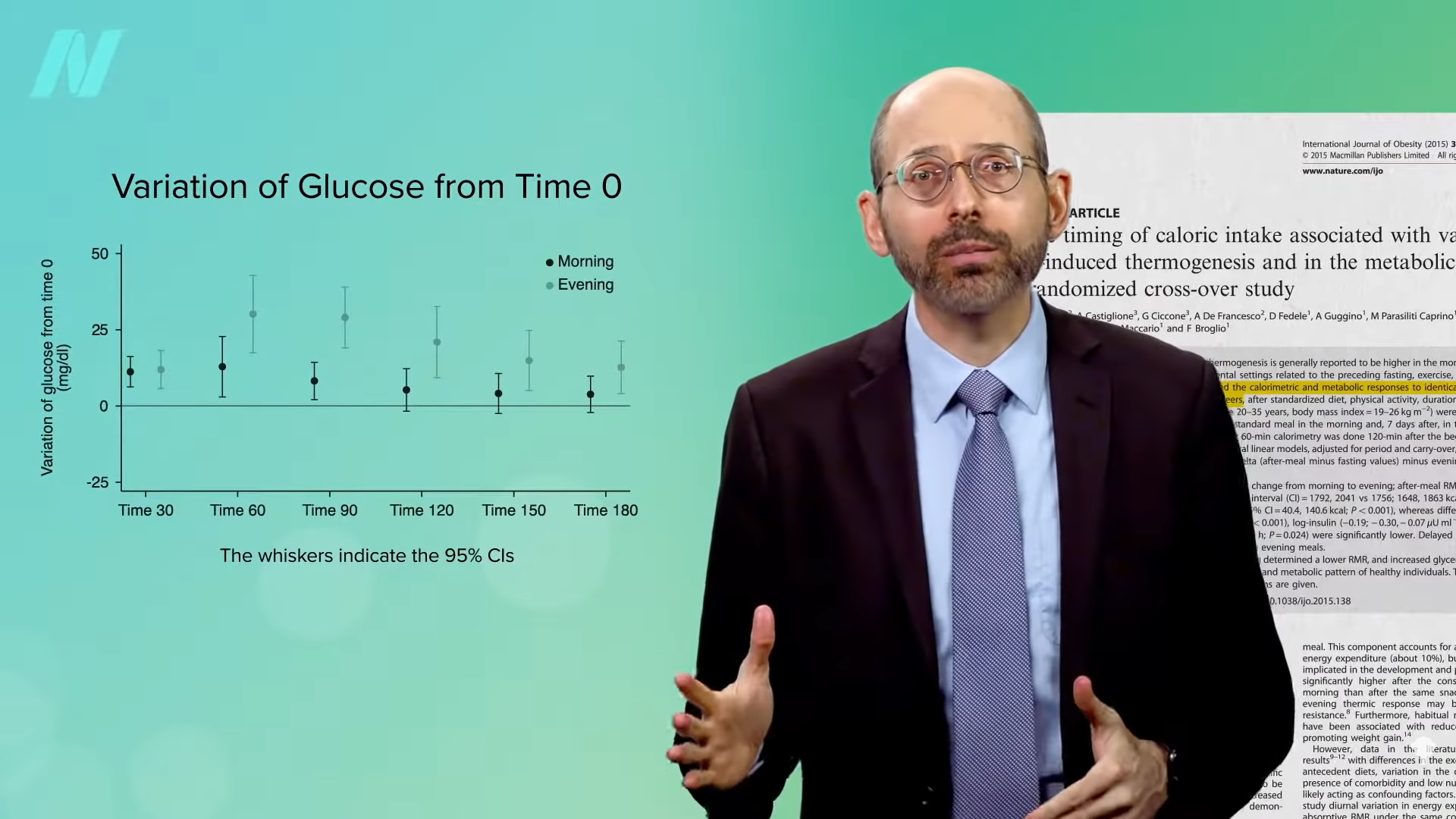
So, shifting the bulk of our caloric intake towards the morning would appear to have a dual benefit—more weight loss, and better blood sugar control, as shown in the graph below and at 5:12 in my video.
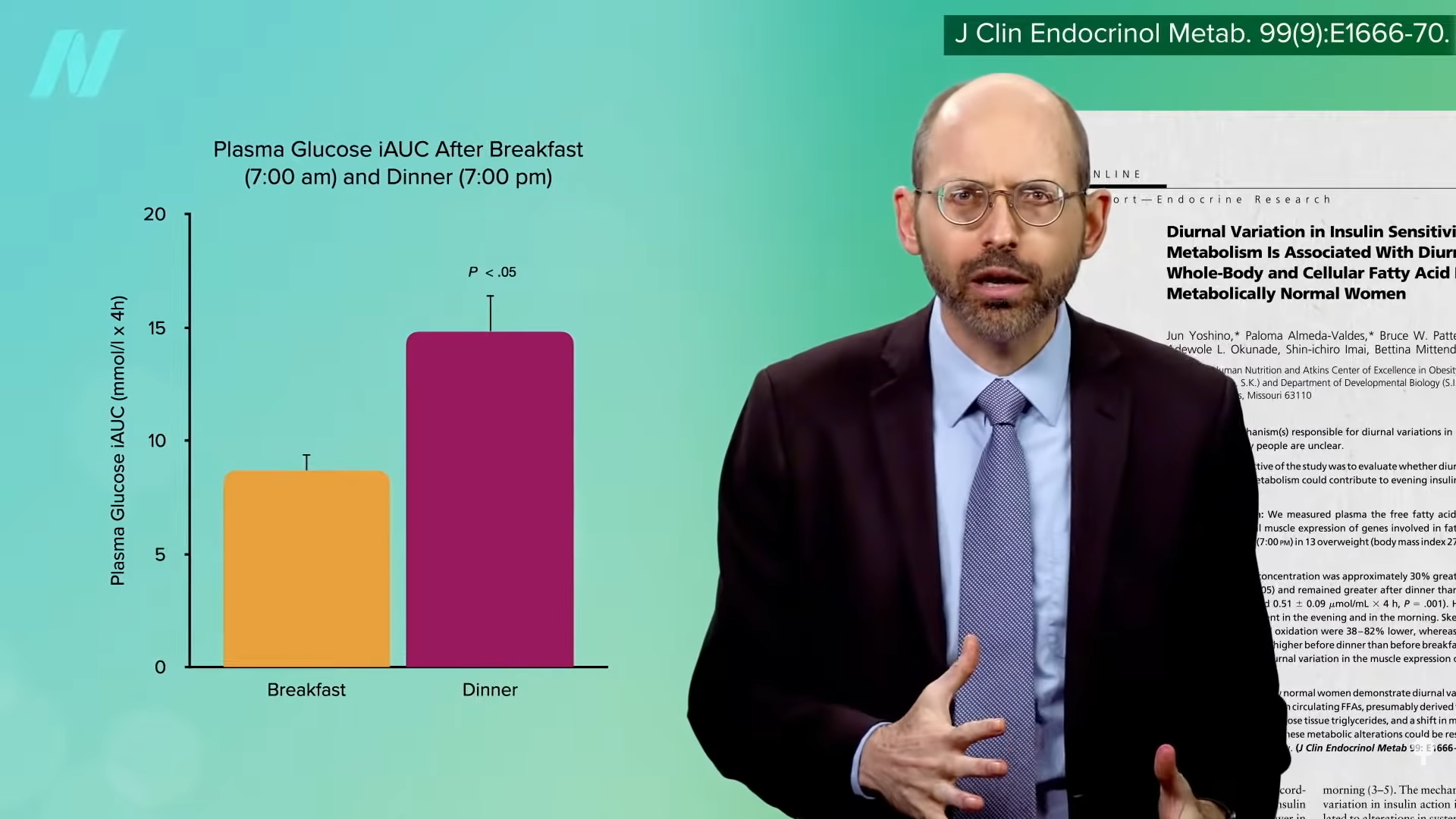
If you thought dual benefits sounded good, stay tuned for triple benefits! I dive deeper into circadian rhythms. See related posts below.
My last few videos (see below) focus on why science points to loading your calories towards the beginning of the day.
[ad_2]

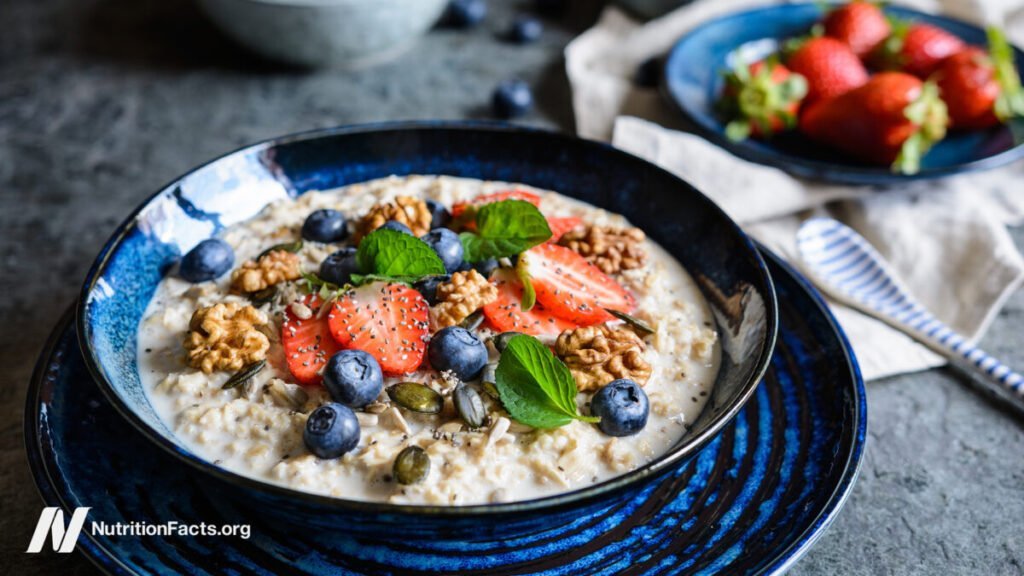

93 Comments
Your article helped me a lot, is there any more related content? Thanks!
Can you be more specific about the content of your article? After reading it, I still have some doubts. Hope you can help me.
Your point of view caught my eye and was very interesting. Thanks. I have a question for you. https://www.binance.com/tr/register?ref=W0BCQMF1
I don’t think the title of your article matches the content lol. Just kidding, mainly because I had some doubts after reading the article.
Thanks for sharing. I read many of your blog posts, cool, your blog is very good.
Your point of view caught my eye and was very interesting. Thanks. I have a question for you.
I am an exciting warm real cams show capable of taking pleasure.
I don’t think the title of your article matches the content lol. Just kidding, mainly because I had some doubts after reading the article.
Your point of view caught my eye and was very interesting. Thanks. I have a question for you.
Can you be more specific about the content of your article? After reading it, I still have some doubts. Hope you can help me.
Can you be more specific about the content of your article? After reading it, I still have some doubts. Hope you can help me.
Thank you for your sharing. I am worried that I lack creative ideas. It is your article that makes me full of hope. Thank you. But, I have a question, can you help me?
Your article helped me a lot, is there any more related content? Thanks!
Your point of view caught my eye and was very interesting. Thanks. I have a question for you.
Your point of view caught my eye and was very interesting. Thanks. I have a question for you.
Thanks for sharing. I read many of your blog posts, cool, your blog is very good. https://www.binance.info/fr-AF/register-person?ref=JHQQKNKN
Can you be more specific about the content of your article? After reading it, I still have some doubts. Hope you can help me.
Your point of view caught my eye and was very interesting. Thanks. I have a question for you.
Thank you for your sharing. I am worried that I lack creative ideas. It is your article that makes me full of hope. Thank you. But, I have a question, can you help me?
Thank you for your sharing. I am worried that I lack creative ideas. It is your article that makes me full of hope. Thank you. But, I have a question, can you help me? binance norādījuma kods
I don’t think the title of your article matches the content lol. Just kidding, mainly because I had some doubts after reading the article.
Thank you for your sharing. I am worried that I lack creative ideas. It is your article that makes me full of hope. Thank you. But, I have a question, can you help me?
Your point of view caught my eye and was very interesting. Thanks. I have a question for you.
Can you be more specific about the content of your article? After reading it, I still have some doubts. Hope you can help me.
**mindvault**
mindvault is a premium cognitive support formula created for adults 45+. It’s thoughtfully designed to help maintain clear thinking
**sugarmute**
sugarmute is a science-guided nutritional supplement created to help maintain balanced blood sugar while supporting steady energy and mental clarity.
**glpro**
glpro is a natural dietary supplement designed to promote balanced blood sugar levels and curb sugar cravings.
**prostadine**
prostadine is a next-generation prostate support formula designed to help maintain, restore, and enhance optimal male prostate performance.
**vitta burn**
vitta burn is a liquid dietary supplement formulated to support healthy weight reduction by increasing metabolic rate, reducing hunger, and promoting fat loss.
**prodentim**
prodentim an advanced probiotic formulation designed to support exceptional oral hygiene while fortifying teeth and gums.
**glucore**
glucore is a nutritional supplement that is given to patients daily to assist in maintaining healthy blood sugar and metabolic rates.
**nitric boost**
nitric boost is a dietary formula crafted to enhance vitality and promote overall well-being.
**synaptigen**
synaptigen is a next-generation brain support supplement that blends natural nootropics, adaptogens
**mitolyn**
mitolyn a nature-inspired supplement crafted to elevate metabolic activity and support sustainable weight management.
**zencortex**
zencortex contains only the natural ingredients that are effective in supporting incredible hearing naturally.
**wildgut**
wildgutis a precision-crafted nutritional blend designed to nurture your dog’s digestive tract.
**yu sleep**
yusleep is a gentle, nano-enhanced nightly blend designed to help you drift off quickly, stay asleep longer, and wake feeling clear.
**breathe**
breathe is a plant-powered tincture crafted to promote lung performance and enhance your breathing quality.
**pineal xt**
pinealxt is a revolutionary supplement that promotes proper pineal gland function and energy levels to support healthy body function.
**energeia**
energeia is the first and only recipe that targets the root cause of stubborn belly fat and Deadly visceral fat.
**prostabliss**
prostabliss is a carefully developed dietary formula aimed at nurturing prostate vitality and improving urinary comfort.
**boostaro**
boostaro is a specially crafted dietary supplement for men who want to elevate their overall health and vitality.
**potent stream**
potent stream is engineered to promote prostate well-being by counteracting the residue that can build up from hard-water minerals within the urinary tract.
**hepato burn**
hepato burn is a premium nutritional formula designed to enhance liver function, boost metabolism, and support natural fat breakdown.
**hepatoburn**
hepatoburn is a potent, plant-based formula created to promote optimal liver performance and naturally stimulate fat-burning mechanisms.
**flowforce max**
flowforce max delivers a forward-thinking, plant-focused way to support prostate health—while also helping maintain everyday energy, libido, and overall vitality.
**prodentim**
prodentim is a forward-thinking oral wellness blend crafted to nurture and maintain a balanced mouth microbiome.
**cellufend**
cellufend is a natural supplement developed to support balanced blood sugar levels through a blend of botanical extracts and essential nutrients.
**revitag**
revitag is a daily skin-support formula created to promote a healthy complexion and visibly diminish the appearance of skin tags.
**neurogenica**
neurogenica is a dietary supplement formulated to support nerve health and ease discomfort associated with neuropathy.
**sleeplean**
sleeplean is a US-trusted, naturally focused nighttime support formula that helps your body burn fat while you rest.
Can you be more specific about the content of your article? After reading it, I still have some doubts. Hope you can help me.
Thanks for sharing. I read many of your blog posts, cool, your blog is very good.
Hiya! Quick question that’s completely off topic. Do you know how to make your site mobile friendly? My website looks weird when viewing from my iphone 4. I’m trying to find a template or plugin that might be able to correct this problem. If you have any recommendations, please share. With thanks!
Thanks for sharing. I read many of your blog posts, cool, your blog is very good. https://www.binance.com/ka-GE/join?ref=RQUR4BEO
Thank you for your sharing. I am worried that I lack creative ideas. It is your article that makes me full of hope. Thank you. But, I have a question, can you help me?
Tham gia cộng đồng game thủ tại Go88 để trải nghiệm các trò chơi bài, poker phổ biến nhất hiện nay.
Với giao diện mượt mà và ưu đãi hấp dẫn, MM88 là lựa chọn lý tưởng cho các tín đồ giải trí trực tuyến.
Đến với J88, bạn sẽ được trải nghiệm dịch vụ cá cược chuyên nghiệp cùng hàng ngàn sự kiện khuyến mãi độc quyền.
Your article helped me a lot, is there any more related content? Thanks!
888slot login apk chính là địa điểm dừng chân lý tưởng, thiên đường giải trí xanh chín đáp ứng đầy đủ tiêu chí anh em không nên bỏ qua. Với sự đa dạng, sức hút và sự cam kết về chất lượng, nhà cái hàng đầu Fun 88 hứa hẹn mang tới cho bạn những trải nghiệm đỉnh cao tuyệt vời cùng cơ hội làm giàu nhanh chóng.
iwin – nền tảng game bài đổi thưởng uy tín, nơi bạn có thể thử vận may và tận hưởng nhiều tựa game hấp
You made various nice points there. I did a search on the theme and found a good number of persons will consent with your blog.
Vấn đề bảo mật luôn được thương hiệu quan tâm và đặt lên hàng đầu. Hội viên khi tham gia sẽ không cần phải lo lắng về vấn đề thông tin cá nhân quan trọng bị rò rỉ hoặc xâm nhập trái phép từ bên ngoài. nhà cái 66b Đăng Nhập không chỉ thiết lập một loạt chính sách quan trọng mà còn cung cấp tính năng mã hóa bảo vệ đa lớp cùng hệ thống tường lửa thép đặc biệt.
Khám phá thế giới giải trí trực tuyến đỉnh cao tại MM88, nơi mang đến những trải nghiệm cá cược thể thao và casino sống động.
Your article helped me a lot, is there any more related content? Thanks!
Your article helped me a lot, is there any more related content? Thanks! https://accounts.binance.info/en/register-person?ref=JHQQKNKN
Downloaded the x777gameapk and it runs really snappy. No lag issues so far, which is a big win. Always good to have it on your phone: x777gameapk
At this time it appears like Drupal is the best blogging platform available right now. (from what I’ve read) Is that what you are using on your blog?
Alright guys, trying out yolobettingsite. Heard good things about the odds. Let’s see if I can make some smart bets and come out on top. Wish me luck! More info here: yolobettingsite
Hey there! I’m at work surfing around your blog from my new apple iphone! Just wanted to say I love reading your blog and look forward to all your posts! Carry on the fantastic work!
Win777slots? Dude, the name alone is worth a try. Hoping for some lucky spins over there! I’m ready at win777slots.
If you’re looking for a place with a ton of options then vn123game is it. I play almost every day and have yet to get bored. Highly recommended!
Okay, philbet88, I see you! Solid platform, fast payouts, and good customer support. Worth checking out if you’re looking for a reliable spot. Join in: philbet88
Rainha dos Slots? Esse nome me chamou a atenção! Já joguei umas rodadas e adorei os gráficos. Tomara que a rainha me abençoe com uns prêmios! Clica aqui: rainha dos slots
Your point of view caught my eye and was very interesting. Thanks. I have a question for you.
**backbiome**
backbiome is a naturally crafted, research-backed daily supplement formulated to gently relieve back tension and soothe sciatic discomfort.
**vivalis**
vivalis is a premium natural formula created to help men feel stronger, more energetic, and more confident every day.
**balmorex pro**
balmorex is an exceptional solution for individuals who suffer from chronic joint pain and muscle aches.
**synadentix**
synadentix is a dental health supplement created to nourish and protect your teeth and gums with a targeted combination of natural ingredients
**alpha boost**
alpha boost for men, feeling strong, energized, and confident is closely tied to overall quality of life. However, with age, stress, and daily demands
I’m really impressed together with your writing abilities and also with the layout to your weblog. Is this a paid subject or did you customize it your self? Either way keep up the nice high quality writing, it is uncommon to look a great weblog like this one nowadays..
This website is my aspiration, really excellent design and style and perfect content material.
Thanks for sharing. I read many of your blog posts, cool, your blog is very good. https://accounts.binance.com/ES_la/register-person?ref=VDVEQ78S
**prodentim official website**
ProDentim is a distinctive oral-care formula that pairs targeted probiotics with plant-based ingredients to encourage strong teeth, comfortable gums, and reliably fresh breath
**herpafend**
Herpafend is a natural wellness formula developed for individuals experiencing symptoms related to the herpes simplex virus. It is designed to help reduce the intensity and frequency of flare-ups while supporting the bodys immune defenses.
**prostafense reviews**
ProstAfense is a premium, doctor-crafted supplement formulated to maintain optimal prostate function, enhance urinary performance, and support overall male wellness.
**aquasculpt**
aquasculpt is a premium metabolism-support supplement thoughtfully developed to help promote efficient fat utilization and steadier daily energy.
**neuro sharp**
Neuro Sharp is an advanced cognitive support formula designed to help you stay mentally sharp, focused, and confident throughout your day.
You actually make it seem so easy with your presentation but I find this matter to be actually something which I think I would never understand. It seems too complex and very broad for me. I’m looking forward for your next post, I’ll try to get the hang of it!
**finessa**
Finessa is a natural supplement made to support healthy digestion, improve metabolism, and help you achieve a flatter belly.
https://askoff.ru
I love your writing style really enjoying this web site.